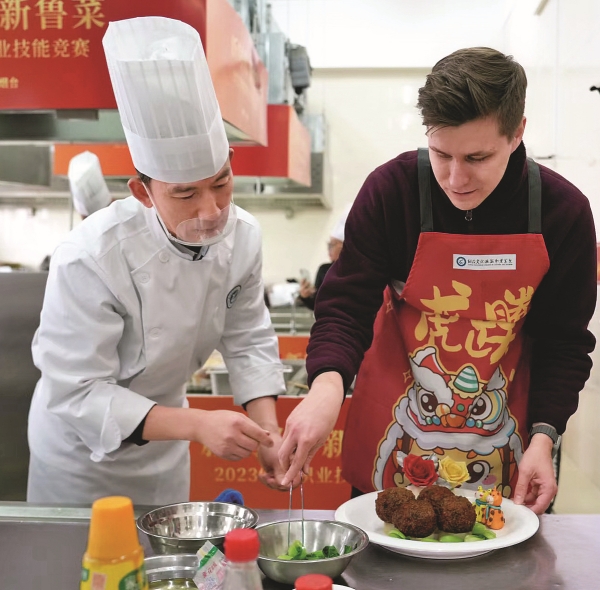Creating a global desire, market for Shandong cuisine
By HAN JINGYAN| (China Daily)| Updated : 2024-12-17
Print Print
Li Mingsheng (left), a teacher of YVCCT, teaches a foreign student to cook braised pork meatballs in gravy sauce during an on-campus activity on Feb 9, which draws over 30 international students from 20 countries. [Photo provided to China Daily]
When Gao Yingjie, a teacher at Yantai Vocational College of Culture and Tourism (YVCCT) in Shandong province, opened a Shandong cuisine restaurant in Norway back in 2015, he didn't expect it to be so popular.
Fushan Restaurant, offering such dishes as Chinese fried prawns, kung pao chicken, kung pao beef and assorted beef, was well-received in the Nordic nation.
Besides winning high praise from Norwegian statesmen, the restaurant has ranked first for many years in Google's ranking of local Chinese restaurants.
"The reason why Shandong cuisine is welcomed by foreigners is that it relies on our rich China taste — flavored with rich Chinese stories and my excellent cooking skills," he said.
Besides Gao, over 80 YVCCT alumni are being employed in enterprises in Japan, South Korea and other countries, while six others are working as chefs at Chinese embassies based in Japan, France and the Central African Republic.
Bao Shusheng, deputy director of the Yantai Shandong Cuisine Research Institute, said: "Shandong cuisine is not only China's, but also the world's."
YVCCT, which was set up in August 1979 and is known as the "Academy of Shandong Cuisine", "R&D Base of Shandong Cuisine", as well as a training base for skilled talent, has tried every effort to boost the globalization of Shandong cuisine, said Jing Xiaoling, president of YVCCT.
Jing said that by aligning with the Belt and Road Initiative, the college has taken a three-pronged approach to deepen the job — expanding international exchanges, absorbing overseas culinary excellence to elevate the "Circle of Connections" and innovating talent training to cultivate more Shandong cuisine professionals.
In expanding international exchanges, she said, YVCCT has sent 13 delegations to visit institutions such as Japan's Hollywood Graduate School of Culinary Arts, Seoul National University and Hyejeon College in South Korea, as well as institutions in Germany, promoting Shandong cuisine stories abroad.
"Meanwhile, we also invited international students from over 20 countries to experience Shandong cuisine through on-campus activities. In addition, we dispatched over 30 faculty and students to visit Japan, South Korea and the Philippines, and received delegations from more than 10 countries, including Italy and Switzerland, to come to our college to facilitate exchanges," she said.
By participating in events such as the National Day banquet food festival hosted by the Chinese Consulate-General in Osaka, Japan, unique Shandong cuisine creations like roasted pear with white fungus and stir-fried rice with sea intestines were showcased, Jing said.
"These efforts effectively narrate the story of Shandong cuisine as distinctive, exquisite, and balanced, highlighting its visual and culinary appeal," she added.
Lyu Shiqiang, Party secretary of YVCCT, said: "Shandong cuisine, as one of the most influential cuisines in China, also needs to borrow the excellence of other culinary flavors," adding that the college has helped standardize the dishes, promotion and evaluation criteria for Shandong cuisine.
Zhang Renshan, a teacher at YVCCT, stressed that the college has also expanded talent cultivation for more professionals, as it thinks that talent is the primary resource for Shandong cuisine's globalization.
By partnering with institutions in Japan, South Korea, Australia and some other countries, the college has co-trained over 1,300 professionals since 2022, he said, adding that it has developed digitalized training standards and curricula, contributing to culinary education in countries such as Spain and Australia.
Moreover, by encouraging entrepreneurship and global outreach, YVCCT has also exemplified its success in promoting entrepreneurship, influencing and training over 4,000 Shandong cuisine enthusiasts worldwide, Zhang noted.

 Xi's Moments
Xi's Moments  Shandong: A treasure trove of high-quality products
Shandong: A treasure trove of high-quality products  Thriving in China: Investment insights on Yantai Huang-Bohai New Area
Thriving in China: Investment insights on Yantai Huang-Bohai New Area